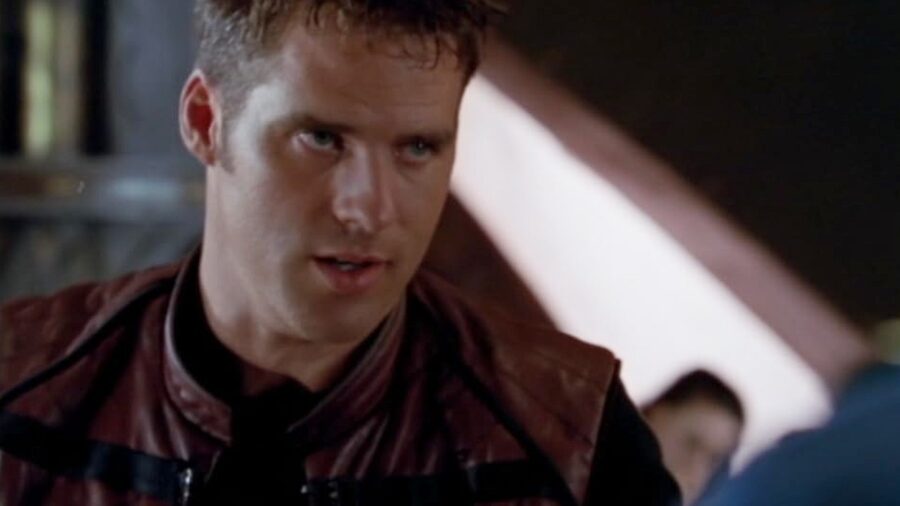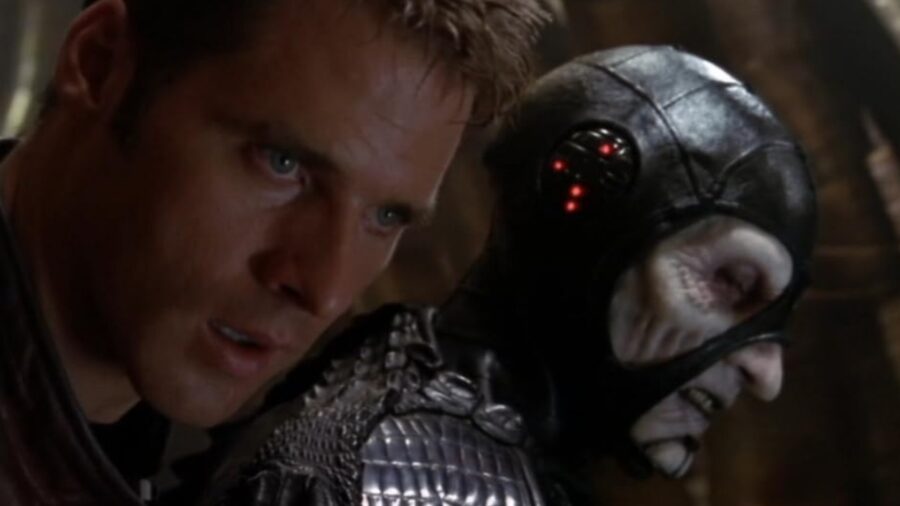Farscape Became A Cult Classic Because Of A Filler Episode

By Jonathan Klotz
| Published
Farscape always struggled to get noticed alongside its sci-fi peers of the late 90s, when Star Trek: Voyager, Stargate SG-1, and The X-Files were all on the air, but it eventually found the perfect balance and became a cult classic. Fans look back now and point to one specific episode as the turning point when the low-budget space-faring adventure with Muppets discovered its voice thanks to the Season 2 episode “Crackers Don’t Matter.” The episode was written specifically to fill a hole in the production schedule, but turning the inherent weirdness of the series up to 11 and focusing entirely on breaking one of Gene Roddenberry’s rules for Star Trek: character conflict.
The Deficient Species

Unlike the crew of the Enterprise, the ragtag ruffians onboard the Moya weren’t part of a unit, and there was no grand vision bringing them together like the Rebels from Star Wars, instead, Farscape started out with everyone out for themselves. At least at first, which is why “Crackers Don’t Matter” was a breath of fresh air, allowing the crew to act on their worst impulses thanks to the subtle influence of T’raltixx. The alien engineer blames nearby pulsars on the crew’s behavior, which can impact “lesser species,” though to the surprise of no one, it’s T’raltixx that’s the problem.
The villain doesn’t matter in “Crackers Don’t Matter” because the real fun and danger come from the Farscape crew losing their minds and lashing out against one another. Somehow, the crackers wind up at the center of the conflict, from Crichton setting Rygel and Chiana against one another over them to the disturbing moment of D’Argo force-feeding Rygel crackers, a moment that actually broke one of the Rygel puppets. It’s not just the crackers, with Aeryn and Crichton unloading their guns in a firefight that only ends when the bullets do, and Pilot finally unleashing the petty passive-aggressiveness we all knew was lurking right under the surface.
The First Appearance of Harvey

Though Pilot insists that humans are deficient, it’s Crichton that saves the day, though no one at the time is aware of it yet, it’s thanks to the first appearance of the Scorpius clone living in his head. Eventually named Harvey by Crichton, the mental clone’s first appearance is one of the highlights of the entire run of Farscape when he appears wearing a Hawaiian shirt and holding a margarita. Intended as a one-off appearance to show Crichton’s insanity, the moment was such a hit that it developed into its own storyline that played out through the rest of the show with Harvey making multiple appearances, sometimes as a Jiminy Cricket helping out his host, and other times to help further Scropius’ quest for the black hole weapon.
Harvey became one of the best parts of Farscape and it’s only fitting he debuts in one of the best episodes. “Crackers Don’t Matter” is a “bottle” episode. The term is used for an episode kept to a single location with a limited cast in order to keep down both time and money, but instead of remaining cheap filler, it changed the tone and tenor of the entire show. Even before fans started praising the episode, the cast and crew knew they had something special here, and you can tell, in retrospect, that this was when the writers decided to keep turning up the crazy dial and shifted the plots to become more character-driven while embracing the bizarreness of the show’s universe.
Farscape isn’t as popular as Star Trek or even Stargate, but it pushed the envelope in a way none of those larger franchises ever have. “Crackers Don’t Matter” is the perfect example, turning a one-off filler episode into one that had lasting repercussions. It’s not just Harvey, as the crew still had a hard time being around each other after trying to kill each other, with Rygel, in particular, remaining wary of D’Argo for the rest of the season, it’s the rare “the cast loses their minds” episode that wasn’t immediately forgiven and forgotten at the end of the adventure. It’s not a perfect series, but when even the supposed throw-away episodes are better than most modern sci-fi shows, you know it’s something special.




